The 1st High-end Interdisciplinary Forum of Information Resource Management and Design was successfully held on July 29, 2023. The Forum was co-sponsored by the School of Urban Design, Wuhan University, Institute of Human-Intelligence Interaction and Digital Intelligence Design of Wuhan University, School of Information Management, Wuhan University, Center for Studies of Information Resources, Wuhan University, and Committee of Information Behavior Research, China Society for Scientific and Technical Information.
The theme of this Forum was Human-oriented Integration and Innovation: A New Starting Point for the Joint Development of Information Resource Management and Design Science, aiming at exploring the prospect and path of the interdisciplinary research of information resource management and design, and meeting the opportunities and challenges in the era of artificial intelligence.

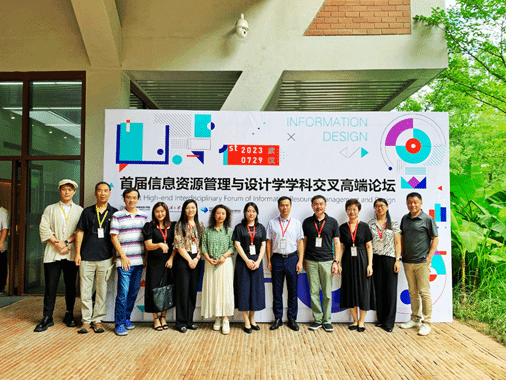
The opening ceremony was presided over by Tingting Jiang, Professor at our School, and the following people addressed respectively:
Zhigang Li, Professor, Dean of the School of Urban Design, Wuhan University,
Wei Lu, Professor, Dean of our School,
Yuelin Li, Professor, Director of the Committee of Information Behavior Research, China Society for Scientific and Technical Information,
Wangheng Chen, Professor at the School of Philosophy, Wuhan University.
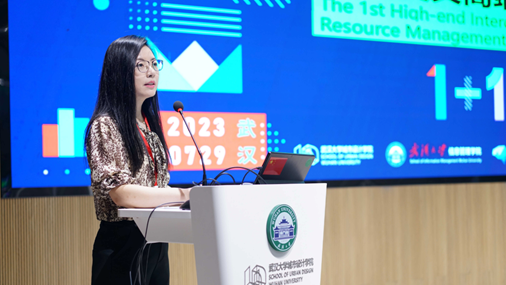
Zhigang Li pointed out that in the era of artificial intelligence, the interdisciplinary research of design and information resource management is of great significance. Firstly, the intersection of the two could deepen the application of artificial intelligence technology in the field of design and information management; Secondly, interdisciplinary research could break the boundaries of disciplines and promote cross-border integration and development of disciplines; Thirdly, the intersection of design science and information management science could promote the integration of art and technology. This kind of integration not only produces new services and products, but also trains students' mastery of integration skills and knowledge. Therefore, the intersection of the two disciplines is of great significance to personnel training.

Wei Lu, on behalf of the School of Information Management, expressed congratulations on the opening of this Forum. He pointed out that information resource management and design science share the vision of creating a better life for mankind, the research of information behavior should be reflected via design, and design needs the support of user behavior research, and the cross-discipline would certainly promote the common development of the two disciplines.
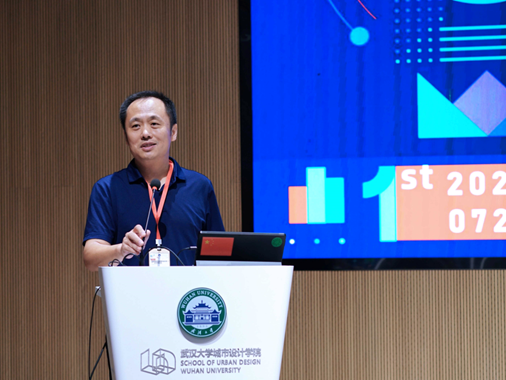
Yuelin Li analyzed the interdisciplinary nature of information behavior research since its birth, and emphasized that with the development of society and technology, many complicated problems could not be solved by a single discipline. We need to have an interdisciplinary thinking to solve the complicated problems we are facing now.
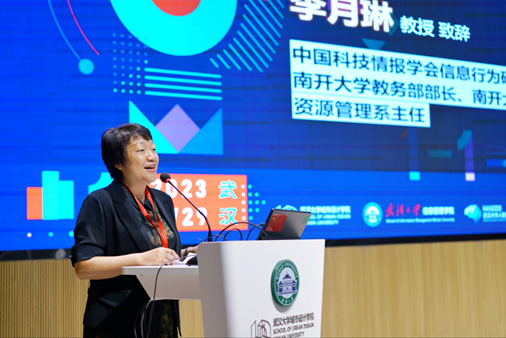
Wangheng Chen believed that design and information always depend on each other and complement each other, and the combination of the two would bring unprecedented revolution to the design field. The key to meet this revolution is to find the best combination of information, information management and design--that is, how to give full play to the advantages of information and make design better serve production and life. As the core of modern information, artificial intelligence undoubtedly provides designers with powerful design tools and techniques, but it also brings new problems and challenges such as ethics and privacy. Designers need to pay attention to these changes, constantly broaden their knowledge and meet the challenges with stronger creativity and aesthetic idea.
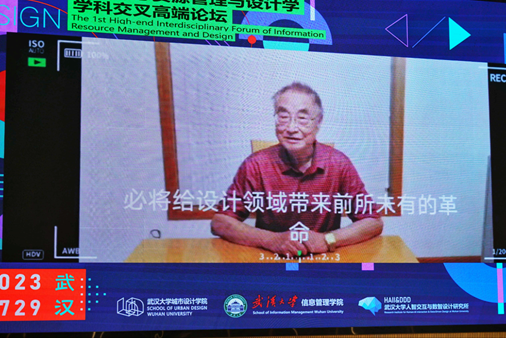
In the second part of this Forum, four outstanding representatives from the two disciplines were invited to give keynote report on the interdisciplinary of information resource management and design, which was presided over by Jun Deng, Associate Professor at the School of Urban Design, Wuhan University.
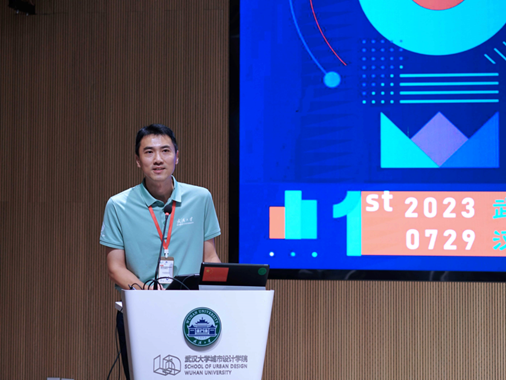
Shijian Luo, Professor at the Department of Industrial Design, College of Computer Science and Technology of Zhejiang University, took the lead in sharing academic report with the theme of Creative Design with Group Intelligence. Creative design with group intelligence is a new concept that Shijian Luo integrated creative design and group intelligence based on the development situation of intelligent era. He believed that creative design with group intelligence is the key direction of design research and design industry development in the intelligent era. From the earliest manual design to computer design, the concept and form of design have been constantly changing, so we should think more about the development of design in the era of artificial intelligence. In addition, the innovation of production tools has brought subversive changes and innovations to the design industry, so design should not stay at simple interfaces and interactions, but should actively participate in digital transformation and integrate into product development earlier.
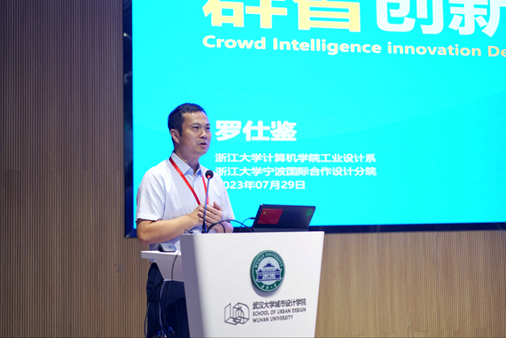
Yuxiang Zhao, Professor at the School of Information Management, Nanjing University, gave a keynote report on the theme of Digital Integration Path of the Elderly and Affordance Analysis of Aging Design. Focusing on the increasingly obvious problem of the digital divide among the elderly, Yuxiang Zhao put forward the general framework of the digital integration of the elderly based on activity theory, and reported a series of research on the use of digital media for the elderly based on affordance theory.

Cheng Luo, Chairman and President of Artop Design Group, brought a report with the theme of Building Brands Designed in China, Empowering High-quality Development. He divided the design into four perspectives: product, industry, society (regional economic development) and civilization, and introduced the representative design achievements of Artop Design Group in these perspectives in recent years. Firstly, based on the perspective of product, he believed that the essence of design is experience behavior, so designers must think about the scene comprehensively before doing. Service and experience are actually a grasp of information, which requires us to refer to the overall information data when designing; Secondly, from the perspective of industry, design is not only a medium-end role, but what we need to think about is what role design plays in the whole industry; Thirdly, as an important strategic link of national development, industrial design should form an industrial driving force to promote regional economic development; Finally, from the perspective of civilization, he proposed that design should be human-oriented and inherit culture and form a cohesive force to promote the sustainable development of ecological civilization.
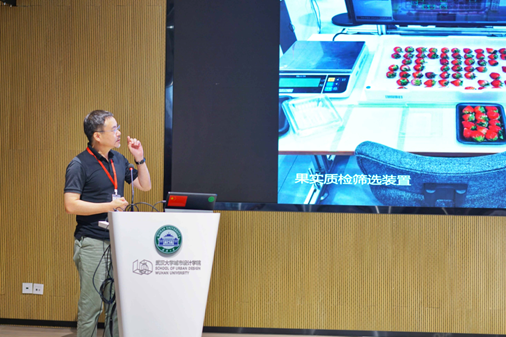
Chang Liu, Associate Professor at the Department of Information Management, Peking University, gave a keynote report on the theme of Design and Appraisal of Search Interface. She reviewed the development of interactive information retrieval, combed the relevant theories of information search, and elaborated in detail what a good search interface is from six stages: formulating query, checking search results, browsing, selecting, interacting with information sources and completing search. In addition, Chang Liu said that although search engines may be diluted in the future, search is everywhere, and we need to think about how to integrate new technologies into search.

The third part of the Forum was the summit, which was presided over by Dan Wu, Dean of the Undergraduate College, Wuhan University, and Professor at our School. Shijian Luo, Pengyi Zhang, Cheng Luo, Tingting Jiang and Jun Deng discussed their own experiences and vision for the future interdisciplinary development.
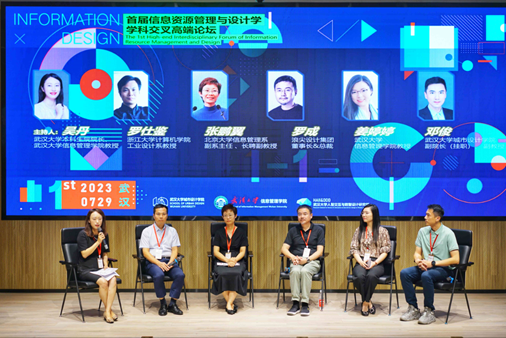
Finally, this Forum ended successfully with applause.